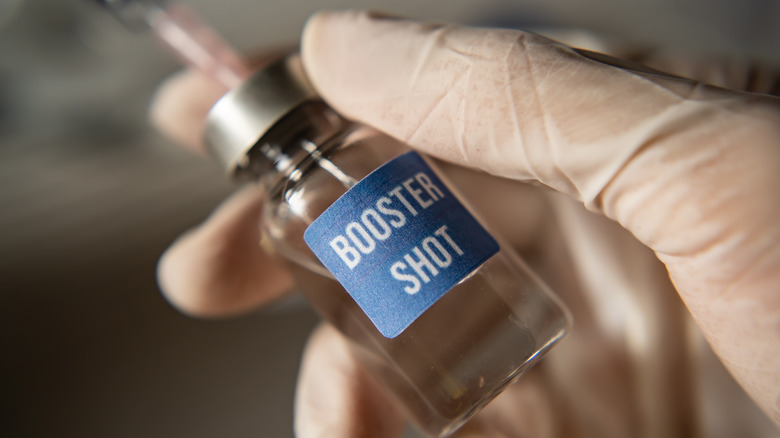Will COVID-19 Booster Shots Have Different Side Effects?
If you're at least 65 or have a compromised immune system, you may be wondering if the side effects of the COVID-19 booster shot are any worse or different than the first two doses of the mRNA vaccines (via New York Times). While everyone will have a slightly different immune response to the COVID-19 vaccines, the side effects of the third Pfizer-BioNTech shot are similar to those felt after the first two doses, according to data released by the U.S. Food and Drug Administration (FDA).
After discovering that the protection provided by a two-dose vaccine appears to gradually decline over time, Pfizer looked at the effects of a third dose of its vaccine on nearly 300 people, aged 18 to 55, who received a booster shot around 5-8 months after their second dose of the vaccine. Their research suggested that the booster shot was both safe and effective, and the side effects were about the same as the two-dose series (via FDA).
Common side effects of Pfizer's COVID-19 booster shot
According to the results of Pfizer's trial study, the overwhelming majority of reactions to the booster shot ranged in severity from mild to moderate, with the top side effect being pain at the injection site (via Insider). Among the nearly 300 trial participants, 83% experienced injection site pain or arm soreness, 63.7% experienced fatigue, 48.4% had a headache, 39.1% developed muscle and joint pain, and 29.1% had chills. Only one participant experienced a severe adverse reaction to the shot. The participant in question experienced lymphadenopathy, also known as lymph node swelling, which went away in five days.
Generally speaking, the side effects of the booster shot should not last more than three days, and the likelihood that the third dose will yield a more severe reaction than the second dose is very slim. "If you've tolerated two doses of a vaccine, you're far less likely to have an anaphylactic reaction to a third dose," Dr. Kawsar Talaat, an infectious disease physician at Johns Hopkins Medicine, told STAT.


